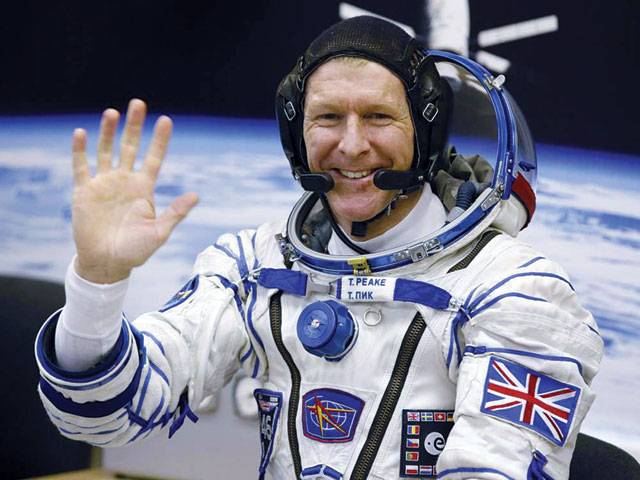BBC London - UK astronaut Tim Peake has thanked the thousands of people around the world who sent him a good luck message, as he spends his first weekend in space.
‘From the schoolchildren who watched the launch in class, people watching on the underground your messages mean a great deal to me,’ he blogged. His blog also contains a selection of some of the best messages from social media sites Twitter and Instagram.
He arrived at the International Space Station for six months on Tuesday. As he does not have the time to reply to each message individually, he wrote: ‘The support for our launch was outstanding, and I want to thank each of you for the #GoodLuckTim messages.
‘From the schoolchildren who watched the launch in class, people watching on the underground, and viewers outside of UK, your messages have shown how much interest there is in space and they mean a great deal to me. ‘A big thank you to those who attended launch celebrations up and down the country and especially the school kids who attended the event at the Science Museum. We are very busy up here but I promise to start sharing more of our life in space soon.’
The former Army aviator and helicopter test pilot has posted three pictures to his Twitter feed since Friday - one of the view towards Earth, one of him giving a thumbs-up to all his supporters and another of him giving blood for experiments being conducted.
On Friday, during a live link-up from the space platform, he said his first few days in space had been ‘absolutely spectacular’.
Answering questions from reporters gathered at the European Astronaut Centre in Cologne, Germany, he said the first two hours had been ‘pretty rough’ and he had been feeling ‘disorientated and dizzy’. But he was able to show them a backwards somersault and said he was surprised how quickly his body had adapted to weightlessness.
From Westbourne, near Chichester in West Sussex, the UK’s first professional British astronaut said the most unexpected thing about the experience so far had been ‘the blackness of space’. ‘We always talk about seeing the view of planet Earth and how beautiful it is and you come to expect that.
‘But what people don’t mention that much is when you look in the opposite direction and you see how dark space is.’ He is among six crew members living and working on the space station. According to the European Space Agency, he has a number of tasks to perform, including unpacking cargo and taking part in an experiment looking at the effects of microgravity on the bone marrow.
Friday, April 19, 2024
Astronaut posts thanks from space

3:56 PM | March 28, 2024
4:14 PM | March 23, 2024
Iconic actor Muhammad Ali being remembered on birth anniversary
10:02 PM | April 19, 2024
Death anniversary of Urdu writer Imtiaz Ali Taj today
10:01 PM | April 19, 2024
Umer Sharif remembered on birth anniversary
10:00 PM | April 19, 2024
Islamabad High Court to monitor Hajj 2024 operations
9:58 PM | April 19, 2024
Pak economy improving, funds will be provided on request: IMF
9:57 PM | April 19, 2024
A Tense Neighbourhood
April 19, 2024
Dubai Underwater
April 19, 2024
X Debate Continues
April 19, 2024
Hepatitis Challenge
April 18, 2024
IMF Predictions
April 18, 2024
Kite tragedy
April 19, 2024
Discipline dilemma
April 19, 2024
Urgent plea
April 19, 2024
Justice denied
April 18, 2024
AI dilemmas unveiled
April 18, 2024
ePaper - Nawaiwaqt
Advertisement
Nawaiwaqt Group | Copyright © 2024





